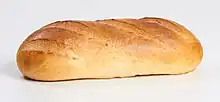manchet
See also: manchèt
English

A loaf of bread made from flour
Etymology
From Middle English manchet, of unknown origin; compare cheat (“low-quality bread”).
Pronunciation
- IPA(key): /ˈmænt͡ʃɪt/, /-ət/
Noun
manchet (countable and uncountable, plural manchets)
- (obsolete or historical) A type of high-quality bread or cracker made from flour.
- 1623 (first performance), John Fletcher, William Rowley, “The Maid in the Mill”, in Comedies and Tragedies […], London: […] Humphrey Robinson, […], and for Humphrey Moseley […], published 1647, →OCLC, Act III, scene ii, page 12, column 1:
- You that can deal with Gudgins,[sic] and courſe floure, / 'Tis pitie you ſhould taſte what manchet means […]
- 1859, Alfred Tennyson, “Enid”, in Idylls of the King, London: Edward Moxon & Co., […], →OCLC, page 21:
- And Enid brought sweet cakes to make them cheer, / And in her veil enfolded, manchet bread.
- 2011 October 15, William Rubel, Bread: A Global History, London: Reaktion Books, →ISBN, page 199:
- As with modern breads, like the baguette, there is no one recipe for a manchet. Each of the few published English recipes from the 1500s and the 1600s is different, though each achieves a result that was accepted as a manchet […]
Dutch
Pronunciation
- IPA(key): /mɑnˈʃɛt/
Audio (file) - Hyphenation: man‧chet
- Rhymes: -ɛt
Derived terms
Descendants
- Afrikaans: mansjet
- → Indonesian: manset
Anagrams
Middle English
Etymology
Unknown; the second element may be chet.
Pronunciation
- IPA(key): /manˈt͡ʃɛːt/, /ˈmant͡ʃɛt/
Noun
manchet (uncountable)
- (rare, Late Middle English) Bread of higher quality (than chet); manchet.
Descendants
- English: manchet
References
- “main-chẹ̄t, n.”, in MED Online, Ann Arbor, Mich.: University of Michigan, 2007.
This article is issued from Wiktionary. The text is licensed under Creative Commons - Attribution - Sharealike. Additional terms may apply for the media files.